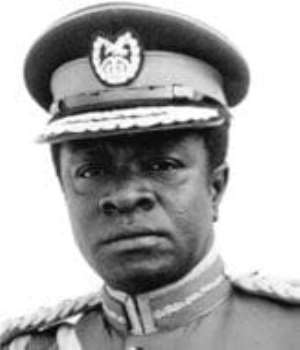
On December 31, 1981, at about 11 a.m., the voice of Flt. Lieutenant Jerry John Rawlings came on air calling for nothing less than a revolution. On the night of Saturday, January 2, 1981, he made a second broadcast on radio and TV in which he accused the Limann administration of deliberately reneging on the pledge to continue the "house-cleaning" exercise.
Rawlings advocated for such an exercise when he first took power through a military coup d'etat on June 4, 1979, with the intention of erasing all manifestations of corruption, profiteering or malfeasance associated in any way with previous governments. As a first step, some senior military officers were executed at the Teshie military range on June 16 and June 26, 1979.
After these executions, the whole country was subjected to a state of terror as the organised violence in the military camps spilled over into the civilian sector. This notwithstanding, majority of Ghanaians saw Rawlings as a blessing to the nation because prior to his taking over power, Ghana was in deep economic crisis. Production of export commodities has decreased, and there were severe shortages of essential commodities such as sugar, soap, bread, milk and even toilet rolls. I remember we had to queue for those items.
As a way of solving this problem of shortages, the Acheampong government adopted the "chit system" to ration the supply of the existing stock of essential commodities, but this system worsened the situation because a few managed to collect large consignments of goods only to sell them at exorbitant prices to the already impoverished citizens of the country. Corruption was at its peak, and the term "kalabule" was coined to denote economic malpractices.
Unfortunately, the then Head of State, General Ignatius Kutu Acheampong was neck deep in the rape of the economy. With the stroke of his famous green ink (pen), he ordered Principal Secretaries of the Ministries of Trade and Finance in particular to issue import licenses to his favourites - young girlfriends, mistresses and Makola market women.
One of such letters read: His Excellency the Head of State and Commissioner for Finance recommends that import license worth 1,152,000 cedis for the importation of one (1) Ford Cortina Estate Car and six (6) Model 3022T Forestmill portable sawmills be issued to Madam Alice Adae Garbrah of Post Office Box 86, Tepa, for the establishment of a rural industry.
Women, those days, especially those who sold at the Makola market were extremely powerful; there were stories of Makola market women pouring urine on some men in military uniforms whenever these women were dared. It was, therefore, not surprising that some soldiers decided to demand their pound of flesh from these female traders: some were stripped almost naked, and others were whipped openly, during the revolution.
But talking about corruption which led to the June 4, 1979 and December 31, 1981 coup d'etats in Ghana, and given the fact that huge sums of money are doled out to buy votes in even internal elections of political parties, especially under this government, the question I am sure some elderly people who witnessed both coups would want to asked is that are we better off under General Kutu Acheampong's regime than today in terms of corruption?
Anthony Obeng Afrane




 List of 24 ministerial nominees approved by Parliament
List of 24 ministerial nominees approved by Parliament
 You were my inspiration, made me who I am today – Lilian Kumah
You were my inspiration, made me who I am today – Lilian Kumah
 Rainstorm destroys Hohoe E.P. Senior High School building
Rainstorm destroys Hohoe E.P. Senior High School building
 John Kumah strongly supported me to become NPP flagbearer – Bawumia reveals
John Kumah strongly supported me to become NPP flagbearer – Bawumia reveals
 Late John Kumah urged me to run for NPP flagbearer, strongly supported me — Bawu...
Late John Kumah urged me to run for NPP flagbearer, strongly supported me — Bawu...
 Akufo-Addo appoints Joseph Kpemka as Deputy MD of BOST
Akufo-Addo appoints Joseph Kpemka as Deputy MD of BOST
 Ablakwa petitions CHRAJ to investigate sale of SSNIT's hotels to Rock City Hotel
Ablakwa petitions CHRAJ to investigate sale of SSNIT's hotels to Rock City Hotel
 MoF to provide new bailout for defunct Gold Coast Fund investors – Bawumia revea...
MoF to provide new bailout for defunct Gold Coast Fund investors – Bawumia revea...
 OMCs implement price adjustments despite International petroleum price declines
OMCs implement price adjustments despite International petroleum price declines
 Petition to remove Kissi Agyebeng will disrupt operations of OSP – Martin Kpebu
Petition to remove Kissi Agyebeng will disrupt operations of OSP – Martin Kpebu
